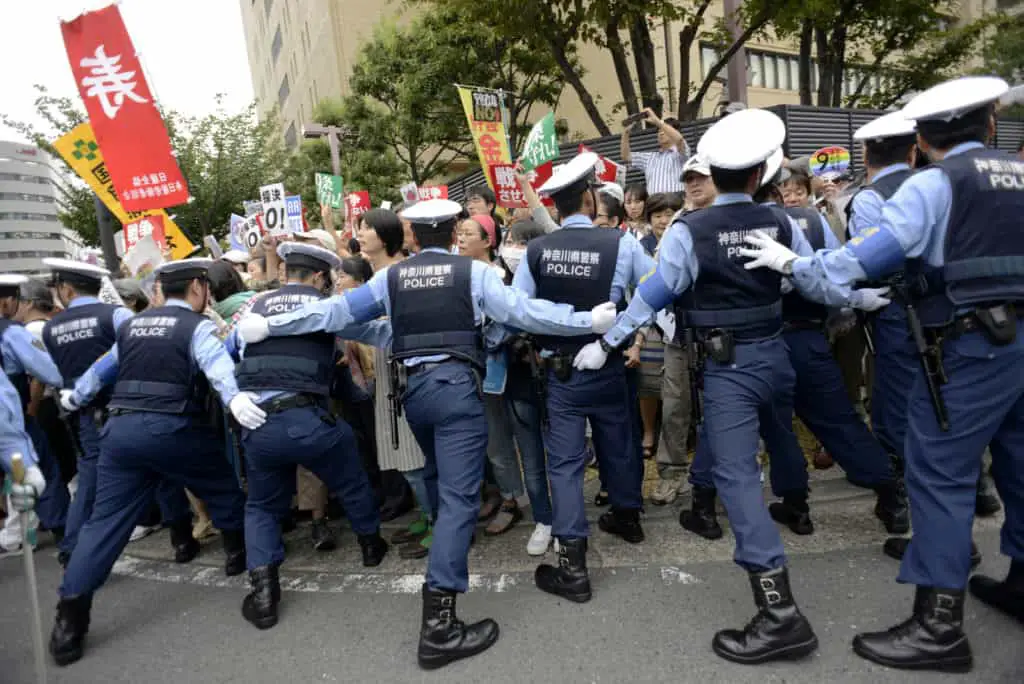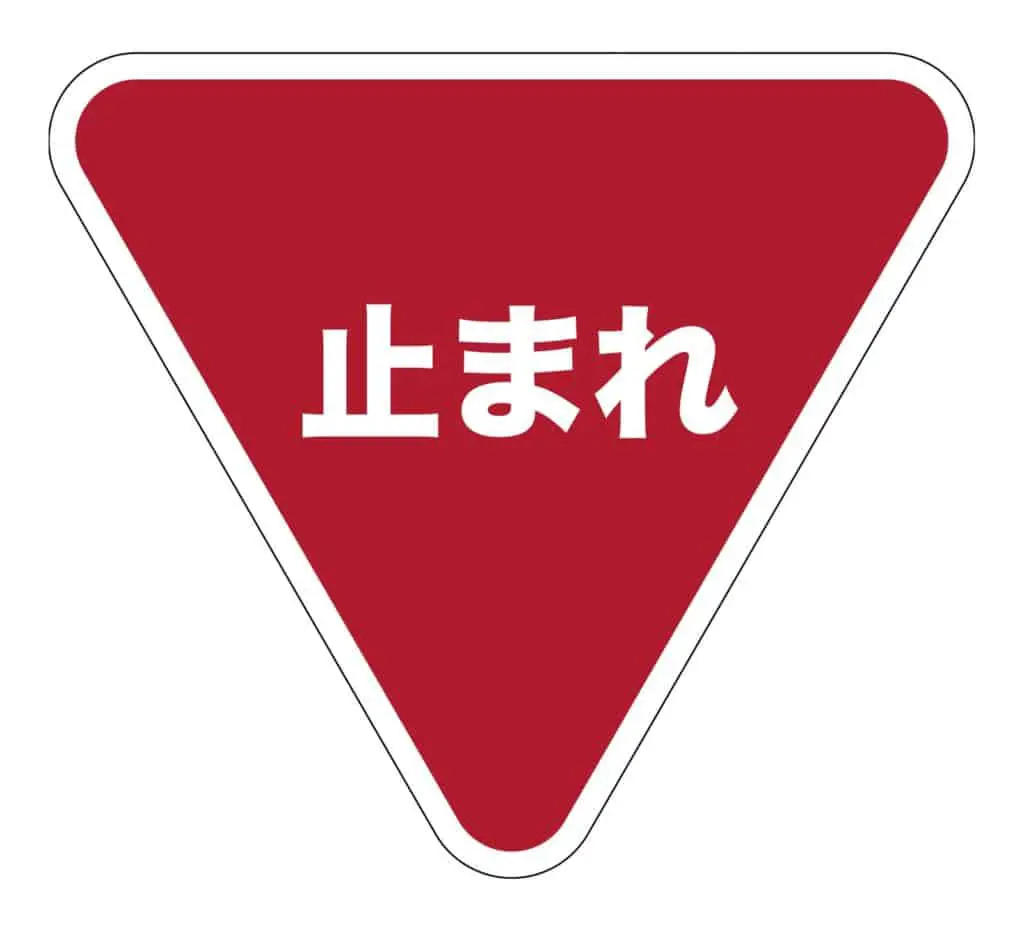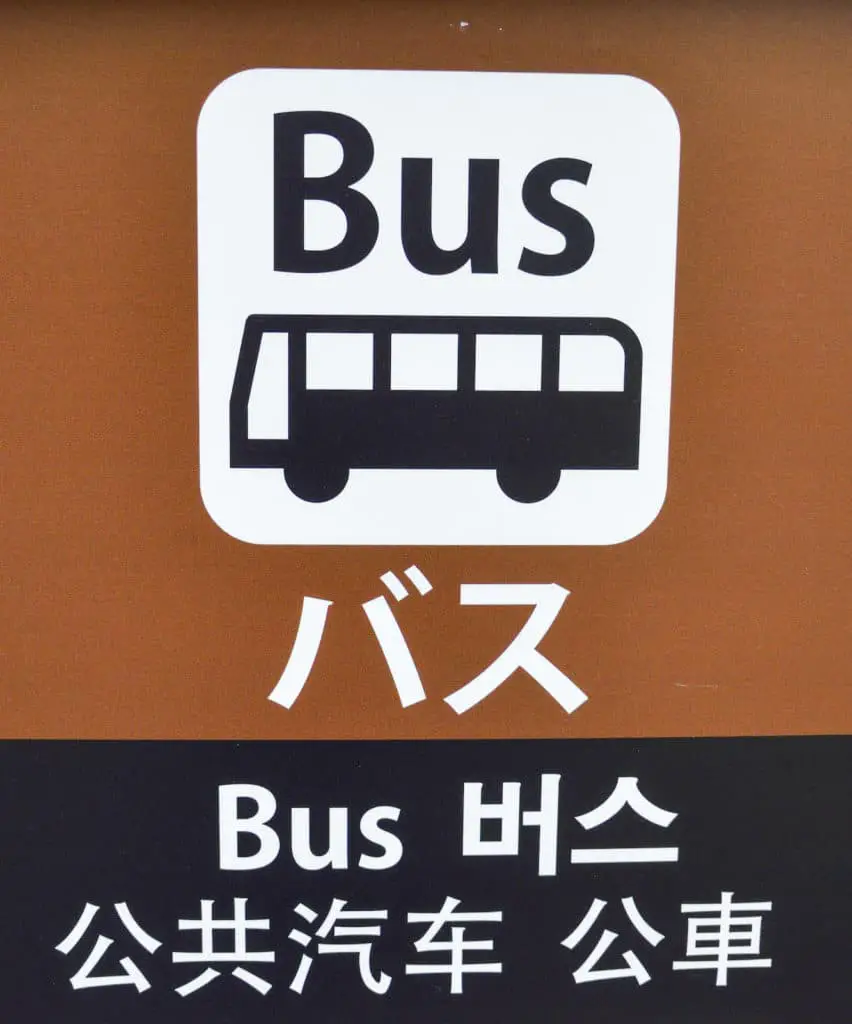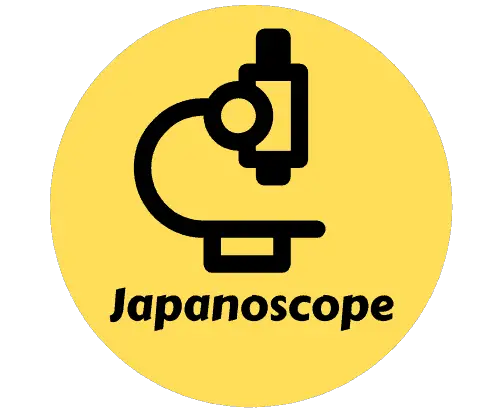
- Various ways to say stop in Japanese
- Stop it! in Japanese
- Example sentences using “yamete”
- Stop it, please! In Japanese
- Examples sentences using yamete kudasai
- Quit it! In Japanese
- Examples sentences using yamero
- Cut it out in Japanese
- やめてくれ
- “Softer” and more polite ways of asking someone to stop something
- Even more polite ways of asking one to stop something in Japanese
- おやめください
- やめていただけませんか
- おやめいただけませんか
- ご遠慮ください
- お控えください
- No in Japanese
- I’m Stopping in Japanese
- Stop (moving) in Japanese
- Come To a Stop in Japanese
- Won’t Stop in Japanese
- Can’t Stop in Japanese
- Halt! in Japanese
- Stop as a loan word in Japanese
- Stop Signs in Japanese
- I’m Going to Stop/ I Won’t do it Again
- It Stopped or “let up” in Japanese
- Stop Doing Something
- Stop, Wait or Hold On in Japanese
- Don’t Stop in Japanese
- Stop as Quit in Japanese
- Meanings of yameru やめる
- Kanji Chinese Characters used to write yameru
- In Conclusion
There are several Japanese words for stop that have worked their way into global popular culture in recent years. Ain’t the internet a wonderful place?
People yelling at each other to “stop” doesn’t really happen that often in real life, but it happens a lot in anime. So with the rise of the popularity of Japanese animation in recent years, Japanese words for stop, like yamete, yamete kudasai and yamero have also, kinda weirdly, entered into the international lexicon.
But there are a lot of other words to describe the idea of stop in Japanese, so I’ll take a look at these here.
And though “stop” may not be one of, say, the first ten words you would probably learn in Japanese, it is probably one of the few words that could potentially be used to save your life.
You never know, right?
If that’s not bang for your buck, I don’t know what is.
Various ways to say stop in Japanese
Stop it! in Japanese
As I mentioned, this word has become pretty well known outside of Japan because of its use in the anime industry, both normal and adult orientated:
やめて
Yamete
Stop it
It is the shortest version of asking someone to stop something, so it is the one that Japanese people want to quickly ask someone to stop something. It is the one most likely to come out as a knee-jerk reaction.
So if, for example, someone was annoying you by poking you with a stick the most common way for a Japanese person to give them a quick “stop it” would be to give a short, sharp:
やめて yamete!
But the word yamete for stop in Japanese can be used in a range of contexts.
Example sentences using “yamete”

お願い、やめて!
Onegai, yamete
Please, don’t!
ねえ, やめて!
Ne, yamete!
Hey, stop it!
冗談はやめて。
Jyodan wa yamete
Don’t joke.
怒鳴るのはやめて
Donaru no wa yamete
Stop shouting!
非難するのはやめて
Hinan suru no wa yamete
Don’t criticise
Stop it, please! In Japanese
To say “stop it, please!” in Japanese you can say:
やめてください
Yamete kudasai
Please stop.
The phrase yamete kudasai is made of two words:
やめて
Yamete
Stop it
ください
Kudasai
Please
This phrase is actually well known outside of Japan, mostly thanks to women saying it in adult videos in the midst of being ravaged (it is what it is!). See our guide to the cultural baggage that yamete kudasai has.
But it is actually a normal word that can be used in everyday conversation.
Examples sentences using yamete kudasai
タバコを吸うのをやめてください
Tabako wo suu no wo yamete kudasai.
Please stop smoking.
廊下での立ち話はやめてください。
rōka de no tachibanashi wa yamete kudasai.
Please refrain from standing around in the hallway talking.
ここでタバコを吸うのはやめてください。
koko de tabako o suu no wa yamete kudasai.
Please refrain from smoking in the area.
飲食物の持ち込みはやめてください。
inshokubutsu no mochikomi wa yamete kudasai.
Food and drink from outside not allowed.
Quit it! In Japanese

The other word for stop in Japanese that is famous outside Japan is yamero. The word became a meme around the world in 2015/2016 after images of crazed looking animals with the word “yamero” printed next to them were posted to tumblr, and then across other platforms.
“Yamero” is actually a very forceful way of telling someone to stop something. It is an imperative form that comes across like a command.
For this reason, you want to be careful about using this one. It suggests that you have some kind of authority or social rank that entitles you to boss people around.
やめろ
Yamero
Quit it!
Examples sentences using yamero

話をやめろ
Hanashi wo yamero
Quit talking!
やめろ!, 黙れ!
Yamero! Damare!
Shut your mouth!
気取るのはやめろ
Kidoru no wa yamero
Stop posing!
問題を避けるのをやめろ.
Mondai wo sakeru no wo yamero
Stop avoiding the problem
彼への非難をやめろ
Kare e no hinan wo yamero
Get off his back!
Cut it out in Japanese

やめてくれ
Yamete kure.
Just stop it.
This is an interesting phrase in that it can either sound quite “masculine” or aggressive, or quite “pleading” depending on how it is said, the situation and delivery.
Personally, it is not it is not one that I ever use, except as a joke. One reason that I don’t use it myself is that it is not a question, it takes the form of a statement or command.
It also sounds quite extreme if you don’t have a personality that is particularly forceful or masculine. You hear this in Japanese drama and anime when a character really wants someone to stop something, but they don’t have the power to stop the other by force. So, for example, if someone is getting tortured (sorry about the extreme example!) you might hear them say yamete kure!
やめてくれ。
Yamete kure.
Just stop it (cut it out)!
Yamete kure is a shortening of the phrase:
やめてくれる?
Yamete kureru
Do you mind stopping?
Yamete kureru takes the form of a question. Kureru means to receive, so you are asking if you can receive the act of a person stopping something. This is fairly polite, but still quite direct.
“Softer” and more polite ways of asking someone to stop something
Japanese has a lot of verb endings you can use to modify what you are saying. Some of them can help make the act of saying “stop it” sound less jarring.
Some choices you could use are:
To make ask someone to stop something in a less direct way than やめてくれる?yamete kureru you can swap out kureru for morau and then modify it to the potential form moraeru in the form of:
やめてもらえますか
Yamete moraemasu ka
Could you stop that for me?
Because you are using a potential form of the verb, you are allowing for the fact that they may be unable or unwilling to comply with your request. We often do this in English when we say “Could you” or “can you” do something.
For example:
ここに車をとめるのをやめてもらえますか
Koko ni kurama wo tomeru no wo yamete moraemasu ka
Could you not park your car here for me?
You can also use the verb morau in the form of moraitai as in “I want you to do something”:
やめてもらいたい
Yamete moraitai
I would like you to stop that.
This isn’t so much a question as a statement of something you are wanting or hoping for. It is thus less direct than some of the options on here.
For example:
毎日テレビを何時間も見るのをやめてもらいたい
Mainichiterebi o nan jikanmo miru no o yametemoraitai
I would like it if you would stop watching TV for hours on end every day.
Another way to soften the blow of a request is to use the ending of chodai.
やめてちょうだい
Yamete chodai
Give it a rest.
Putting chodai on the end of a phrase to mean “please give me” has a cute, almost child-like sound to it. Saying “stop it” this way definitely “softens the blow” somewhat.
智ちゃん、わんちゃんをいじめるのをやめてちょうだい。
Tomo chan, wan chan o ijimeru no o yamete chōdai.
Tomo, no annoying the dog, ok?
やめてほしい
Yamete hoshii
I want you to stop that.
Japanese being a very polite people, and a very polite language, have the uncanny ability to express dissatisfaction with a person or situation while still showing respect.
Even more polite ways of asking one to stop something in Japanese
Japanese is a very polite language. It has got a bunch of ways of putting things to make them sound more honorific, or humble, or less direct.
Here are some forms of “stop it”, but in a very polite form.
おやめください
oyame kudasai
Please don’t.
Putting the honorific “O” on the front of a word makes it much more polite.
やめていただけませんか
Yamete itadakemasen ka
Would you mind stopping that?
“Itadaku” is a super polite verb form of the word “morau”, meaning to receive. So in a sense, in this phrase, it is like you are saying “May I receive the gift of you stopping what you are doing”.
Putting the “itadaku” into negative form as “itadakemasenka”, as in “won’t you?” gives the person you are speaking to an easy option of turning you down, and thus makes it a softer, more polite, way of telling someone to do something.
おやめいただけませんか
o yame itadakemasen ka
If you take the phrase above and put an “O” in front of it, it gets politer still!
Of course, however much you dress up “yamete” you are still, fundamentally telling someone to stop something.
To get around this, Japanese also has options of words that are less direct, such as:
ご遠慮ください
go enryo kudasai
Please refrain from
お控えください
o hikae kudasai
Please abstain from
No in Japanese
I’m Stopping in Japanese
If you want to say that you are stopping something, rather than ask someone else to stop doing something, you can use the form:
ABCをやめる。
ABC wo yameru.
I’m going to stop ABC.
息子の悪口をいうのをやめる。
musuko no waruguchi o iu no o yameru.
I’m going to stop complaining about my son.
Note that this sentence doesn’t include the word “I” or “watashi” in it anywhere. You can add this in if you want at the start of the sentence for emphasis. But generally Japanese people don’t really use the words “I” or “You”. You can generally know who is talking about who from context. In some ways, this makes things easier for foreign speakers, because you can leave out large parts of sentences. But sometimes this can be confusing too, if you are not sure what context people are saying something in.
But that’s part of the fun of Japanese!
Stop (moving) in Japanese

The way to tell someone to stop moving (as in running, walking, driving etc.) is to say:
止めて。
tomete.
Stop.
This is the imperative te-form of the verb to stop 止める (tomeru).
You can use it for, say, shouting that iconic phrase from the movies:
電車を止めて!
Dennsha wo tomete!
Stop the train!
You can, of course, make this politer by putting the word please “kudasai” on the end to make tomete kudasai.
I suggest leaving out the politeness when you are shouting at people to “stop the train!” though 🙂
Come To a Stop in Japanese
Now, at the risk of getting a bit boring and technical here, if you are learning a language you need to get familiar with the idea of transitive and intransitive verbs. Strangely enough, I didn’t know about these before I learned Japanese and it was actually quite exciting to learn the concept (I know, a little sad right?).
Basically, it is the difference between stopping something, and something coming to a stop.
Transitive verb
A transitive verb is when someone does something to something else, such as hit a ball, or tie a shoelace or eat an icecream.
In Japanese, for stop it sounds like:
電車が止まった。
Densha ga tomatta.
The train stopped.
Intransitive verb
This is when something happens by itself, of its own accord, as in the ball stopped, my shoelace came undone, the ice cream melted.
In Japanese, to stop it sounds like.
私が電車を止めて
Densha ga tomatta.
I stopped the train.
This is a sentence I aspire to actually say at least once in my life 😉
Won’t Stop in Japanese
So to say something “will not stop” or “won’t stop” you would say “ABCが止まらない” ABC ga tomaranai.
Here’s what it looks like.
出血が止まらない場合は、病院に行きなさい。
shukketsu ga tomaranai bāi wa , byoin ni ikinasai .
If the blood doesn’t stop, go to hospital.
世界を支配するまで私は止まらない。
sekai o shihai suru made watashi wa tomaranai .
I won’t stop until I rule the world.
進歩は止まらない。
Shinpo wa tomaranai .
You can’t stop progress.
Can’t Stop in Japanese
Similarly, can’t stop takes the same form as “won’t stop” in Japanese:
笑いが止まらない
Warai ga tomaranai
I can’t stop laughing.
涙が止まらない。
namida ga tomaranai .
I can’t stop crying.
くしゃみが止まらない
kushami ga tomaranai
I can’t stop sneezing.
Halt! in Japanese

とまれ!
tomare!
Halt!
To say the very police-like commands of “halt”, “freeze” or “stop” in Japanese you would say tomare!
Hopefully you never have the need to either say or hear this in a law enforcement context!
That being said, it is conceivable that you may need to forcefully tell a person to stop at some point.
Tomare of course sounds very harsh. Probably for this reason, you don’t hear parents using this with their young children very often to, say, stop them from running onto a road.
They usually use the English word for “stop” as a loan word for this.
Stop as a loan word in Japanese
You often hear parents yelling out their children in Japan:
ストップ!
Sutoppu!
Stop!
It is pretty much used in similar ways to the English word “stop” that it comes from.
I find it interesting that Japanese often use English loan words in Japanese for words that are slightly uncomfortable in any way. I place “sutoppu” in this category.
Telling someone to stop something inevitably has an element of uncomfort to it. Saying something in a foreign language helps distance the word and idea somewhat.
We do this in English too with many French loan words. Words such as beef and pork for meat come from French. Using them probably originally sounded a little less “icky” than saying you were eating a cow or a pig. We also use words like midnight “rendezvous” to describe a meeting that was probably romantic and possibly sexual.
You also often hear Japanese people using “stop” as a loan word to say “that’s enough thanks” when pouring a drink.
Stop Signs in Japanese

Stop signs in Japan feature the word tomare 止まれ. This is the imperative form of tomaru 止まれ.
It’s the same word that also gets used by police to say “halt”.
It makes sense for street signs to be short, direct and commanding, so it is no surprise that this form of stop is used rather than something longer.
Did you ever see an English stop sign that said “Please stop!”
Maybe we need to start a movement for politeness in street signs? Maybe not.
Japanese stop signs are an inverted red triangle.
The also write the word tomare 止まれ in white paint on the actual road itself, but written back-to-front, top-to-bottom so you get re ma to れま止. The idea here is that the first letter is closest to the car as it approaches.
I’m Going to Stop/ I Won’t do it Again
It Stopped or “let up” in Japanese
The word yameru for stop also appears in intransitive form as yamu.
This is mostly heard in relation to the rain stopping of its own accord (which is, of course, the only way it ever stops!)
雨がやんだ。
Ame ga yanda.
The rain stopped.
The same form is assumed for other weather events including wind, storms and snow.
Interestingly, Japanese also draws a similarity between weather events and emotional events. If you’ve ever heard Tom Waits sing “Emotional weather report”, you should look it up!
子供が焼き止んだ。
Kodomo ga nakiyanda
The child stopped crying.
Stop Doing Something
You can also ask someone to stop doing something using the form:
Negative verb form + で de
So if you wanted to asked someone not to go, you would say:
行かないで
Ikanaide
Don’t go!
Or you could say:
パーティーまでケーキを食べないでね
Patei made keiki tabenai de ne
Keep your hands off that cake until the party.
Or you could use naide like this:
壊れないように大事に使ってね
Kowarenai you ni daiji ni tsukatte ne
Make sure you treat it with care so it doesn’t break.
Stop, Wait or Hold On in Japanese
Japanese often use the word for wait in a similar way to how we might say stop in English:
Stop, wait!
待って
matte
So if a Japanese was yelling at someone driving off in a car that they wanted to get a lift in they would yell matte, where we might just as likely yell “stop!” in English.
Don’t Stop in Japanese
やめないで
yamenaide
Don’t Stop
For example:
お金がまだ足りないから仕事を辞めないで。
Okane ga mada tarinai kara shigoto wo yamenaide
We don’t have enough money yet, so don’t quit your job!
Stop as Quit in Japanese
仕事が面白くなかったから、辞めた。
Shigoto ga omoshirokunakatta kara yameta
My job was no fun, so I quit.
Here it is worth mentioning that there are actually different meanings of the word yameru depending on the context. Each of these meanings has a different kanji character used to express it.
Meanings of yameru やめる
To understand yamero properly, you first need to understand the word that it is based on.
The word yameru in Japanese has three main meanings.
If you look it up in a dictionary you get:
Yameru (止める、已める、 廃める) meaning #1
1 to stop (an activity); to cease; to discontinue; to end; to quit
2 to cancel; to abandon; to give up; to abolish; to abstain; to refrain
Yameru (辞める、罷める、 退める)meaning #2
In a related meaning yameru can also mean:
To resign; to retire; to quit; to leave (one’s job, etc.)
Yameru (病める、痛める)meaning #3
Yameru also has a totally different meaning unrelated to the first two:
sick; ill; ailing
Kanji Chinese Characters used to write yameru
Yameru can be written with several different Kanji Chinese characters, to express the different meanings of the word:
止める
已める
廃める
病める
痛める
病める
痛める
Perhaps because there are so many characters to choose from when writing yameru, it is very common for Japanese people to write the word in Hiragana as やめる.
Of the Kanji that are used, the first one 止める is the most common.
This is the same character that you see written on roads and road signs in Japan saying 止まれ tomare, meaning “Stop”.
How do you say stop in anime?
The most common word you hear people saying for stop in anime is yamero.
Anime is full of colorful, powerful characters, and yamero is a very forceful way of saying “stop”.
Here are some examples of people saying stop as “yamero” in Japanese anime:
#1「勝ちてーならやれ 負けていいならやめろ 勝ちてーのにやめる そんな選択肢はねえ!」(弱虫ペダル)
” kachi te – nara yare makete ii nara yamero kachite – no ni yameru sonna sentakushi wa nē!” yowamushi pedaru
If you are determined to win, go for it. If you don’t mind losing, then quit. But if winning is what you want, then quitting isn’t an option. (Yowamushi Pedal )
#2「その作り笑いを止めろ!」(「五等分の花嫁」風太郎)
” sono tsukuriwarai o tomero !”” go tōbun no hanayome” Kaze Tarō
Cut out the fake laughter! (The Quintessential Quintuplets)
#3 やめろと言ったろ、死にたいのか!? (機動戦士ガンダムSEED キラ•ヤマト)
yamero to ittaro, shinitai no ka!? kidō senshi gan damu SEED kira Yamato
I told you to let up, do you want to die? (Mobile Suit Gundam SEED – Kira Yamato)
#4 やめろ…もうやめてくれー!やめろーーー!!(サトシ/ミュウツーの逆襲)
yamero mō yametekure -! yamero —!! Satoshi myūtsu- no gyakushū
Stop…just quit it! Stop! (Pokémon: The First Movie)
#5「やめろォオオ!やったら殺すぞォ。絶対殺す、絶対だぞ!やめろォオ、やめろオオ。」(うしおととら(漫画) : 第四十八章「雷鳴の海」 – 其ノ九「憎しみの海」)
” yamero xooo ! yattara korosu zo xo. zettai korosu, zettai da zo ! yamero xoo, yamero oo.” ushi oto tora manga : dai yon jū hachi shō” raimei no umi” – no kyū” nikushimi no umi”
Stop! If you go ahead, I’ll kill you. I swear I’ll kill you, I swear! Quit it, quit it! (Ushio and Tora)
Bus Stop

Bus stops in Japan are called:
バス停。
basu tei.
Bus Stop.
This is my train stop
If you need to tell people “this is my stop” or “getting off!” when you are on the train you can say:
降ります!
Orimasu!
Getting off.
Orimasu literally means “to get down off” something.
Kinda cool that you can use just one word to tell people this is your stop, right?
Do men say Yamete?
Both men and women say “yamete” as it is an everyday part of the Japanese language. In popular culture you often hear men saying “yamero” because it is a forceful term that is appropriate to use in high-drama situations and strength is often perceived as a more masculine trait. This is, of course, not a hard-and-fast rule and both men and women use both yamete and yamero.
In Conclusion
There are a lot of words for stop in Japanese. But that is true of English too.
Hopefully this article has given you a bit of an overview of when each word is used where.
We’ve also got articles looking at the same sorts of vocabulary from a Japanese perspective with articles on the meaning of yamete kudasai and the meaning of yamero.
Ok, I think I need to stop now myself. Over and out, transmission over, stop.
